- Home
- Iain Banks
Canal Dreams Page 9
Canal Dreams Read online
Page 9
'Comrade Major, Broekman said, putting his watch into the bag. 'I don't suppose you're going to tell us what you're doing, are you?
'Huh?
'Why are you doing this? Why are you occupying the ships?
'Is Free Panamanian Navy, Sucre laughed. He moved off to take watches from other people. He stopped, looked back at Broekman. 'Where you from?
'South Africa, Broekman said.
Sucre sauntered back. 'You fascist? he asked. Hisako felt her palms start to sweat.
Broekman shook his head. 'When I was there they called me a communist.
'You like blacks?
Broekman hesitated. Hisako could see him composing his reply. 'I don't like anyone automatically, Comrade Major; black or white.
Sucre thought about this, nodding absently. 'OK, he said, and moved off again. Hisako breathed out.
She bought a new cello with one lot of prize money. She took her old cello back to Hokkaido for the winter holiday, leaving the new one in the Academy, not knowing quite why she did this. Hisako had a decision to make. She might stay on at the Academy, or she might go to Todai — Tokyo University — every Japanese kid's bright shining wept-for goal. She'd known people who had broken their hearts when they could not get into Tokyo. You heard all the time of people killing themselves because they didn't get good enough grades, or because they'd failed when they got there and found the work too hard.
Did she want to do this? English at Todai. It would have seemed absurd just a few years ago, but her grades had improved that much; she honestly had no idea why. She thought she probably could do it; she had become a good student, and she had the enthusiasm in the subject she thought necessary to carry her through.
But was she ready for the pressure? Did she really want to be a diplomat or civil servant, or a teacher or translator? Or somebody's highly qualified wife? None of those things attracted her. She didn't particularly want to travel, for one thing, which closed off diplomacy, or marriage to a diplomat; she always felt slightly queasy at the thought of getting on a plane. And she wanted to read and speak English because she enjoyed it, not because it was her job.
But she didn't know if she wanted to play the cello for a living either. She loved that too, and thought she might be good enough to join an orchestra, but the same problem applied; anything she loved that much might be spoiled if it became her work.
As though to take her mind off it, she had become very athletic, spending more time in the Academy's gym than her cello tutors thought proper. She lost herself in the developing abilities of her body.
The ferry journey north that winter was a wild, rough affair, but she sat outside part of the time, hugging her old cello case to her, her teeth chattering, her hands raw and red in her mittens, the salt spray a taste on her lips and a cold and grainy sweat on her face, while the ship pitched and rolled and the white waves tumbled and slid, battering the ferry like one sumo wrestler slapping another out of the ring.
Her mother looked suddenly aged. Hisako sat with old friends in Sapporo cafes, and found she had little to say to them. She went to the ice festival, but found it preposterous. She did some skiing but sprained her ankle early on in the holiday and spent the rest of it either in bed or hobbling around.
She went to see Mr Kawamitsu. It was too long since she'd visited him, always finding excuses. She had called once before and, finding him out, realised she was relieved he wasn't there. But now she went in hope, and he answered the door.
Mr Kawamitsu was pleased to see her. His apartment smelled of yuzu and new tatami mats. Mrs Kawamitsu made tea for them.
They talked about Jacqueline du Pré. Mr Kawamitsu thought Hisako could be an oriental du Pré. Hisako laughed nervously, hand over her mouth.
'Oh… judo, karate, kendo… you have become ninja, Hisako, Mr Kawamitsu said when she told him of her newfound interests.
She bowed her head, smiling.
'But this is not very feminine for a young woman, he told her. 'So… aggressive. Won't you frighten off all the boys?
'Perhaps, she agreed, still staring at the floor. She fiddled with the cotton edging of the tatami mat.
'But perhaps that is not so bad, if you want to be a great cellist?
She bit her lip.
'Do you want to be a great cellist, Hisako? Mr Kawamitsu asked, in a formal manner, as though it were part of a temple ceremony.
'I don't know, she said, looking up at him, and suddenly feeling very young and somehow clear, and seeing how Mr Kawamitsu too had aged. She felt glowing and pure.
Mr Kawamitsu nodded slowly, and poured more tea.
On the ferry back she sat outside again, watching the pitching, ragged sea, and the dark veils of distant squalls. Once more, she clutched the old cello case to her, looking across the empty deck and out over the cold turbulence of sea, resting her chin on the shoulder of the cheap but — to her — precious old case, and shivering every few seconds. After a while she stood up, crossed unsteadily to the rail on the shifting deck, lifted the cello and its case up over her head and threw it into the water. It fell flat to the waves and hit with a thud she thought she heard. It floated off, falling astern, tossed and blown across the cold grey sea like some strange up-ended boat.
She got into trouble; somebody saw the case in the water and was sure it was a body. The ferry slowed and turned, heeling over alarmingly as it turned broadside to the storm, and headed back. She hardly noticed at the time, locked in a toilet, sobbing.
The ferry was way behind schedule anyway, but lost another couple of hours retracing its course to look for the 'body'. Incredibly in that furious sea, they found the old case, bobbing mostly underwater, just the head showing. They got a rope round it and hauled it aboard. Hisako's name was inside the case. The Academy was informed. She was punished with extra duties in the hostel, and additional lessons on a Sunday.
The old cello was ruined, of course, but she kept it, and then one Sunday in the spring, after her punishment had ceased, and while the cherry blossom painted the Tokyo parks pink, she took the water-warped cello and its salt-stained case on the train to Kofu, climbed to the bald summit of a hill to the north of the Fuji Five Lakes, and in a clearing using several cans of lighter fluid cremated the instrument in its battered, twisted coffin.
The cello groaned and creaked and popped as it died, and the strings snapped like whips. The flames and smoke looked pale and insubstantial against the budding trees and the bright sky, but the heated fumes, rising through the clear fresh air of spring, made Fuji itself tremble.
The warriors moved amongst the people trapped in the great room. She sat with Philippe. The room was like a vast ballroom, with a complicated ceiling. Metal beams soared overhead, painted yellow and grey but when she looked harder — she was not sure if they supported panes of glass or not. In the huge room there were pools of water and clumps of trees and little hills covered in shrubs and flowers, and naked women moved slowly in the distance, carrying towels. Mists rose from the warm waters of the pools, curling around red ceremonial arches, which stood in the choppy waves like letters in a foreign alphabet. On a black shore, by the side of a gently steaming pool, smiling people all lying in a line were being slowly covered with dark sand.
Out in the pool, its surface half-obscured by the rising folds of vapour, a woman surfaced, wearing a black bathing cap on her head, a pair of rubber goggles over her eyes, and nose-clips on her nose. She bobbed in the water, making a sad whistling noise. In her hand, between thumb and forefinger, she held something small and lustrous and white.
She looked away from the woman. On the beach they were still being covered by the black sand; yellow-uniformed attendants with plastic shovels heaped the dark stuff over the smiling, chatting people, slowly burying them. She looked up at the clock, high up in the dome, but it was half-melted, like. a painting, and stuck at 8:15. She looked at her own watch, but it showed the same time.
The warriors came closer, collecting bits of people.
<
br /> On a hill outside the great glass room she could see the castle. It was warm in the ballroom, but outside there was snow. The massive dark stones of the castle were edged in white, and on each level of soaring roofs — like the wings of some great black crow, frozen in flight — snow lay, blending the castle's tall shape into the milky sky.
The warriors came to her and Philippe. They wore long stiff skirts of brown and grey, and their faces were obscured by long mesh masks; they held long cane rods in both hands. They brought the rods down on people, turning the parts they hit to gold. They touched them on the hand or the foot or the leg or the arm, or touched their torso, or their head. Wherever they touched somebody, they would name the part they touched. That part would turn to gold, leaving the rest unharmed. The unharmed bits lay inert and dry on the tiles, or only twitched slightly. Warriors following behind the caneswordsmen collected the golden body-pieces in a big sack, apologising.
The swimming boy had a leg removed, the fat pharaoh his head (he sat, headless, a smooth pink stump where his neck had been, impatiently tapping his fingers on the tiles at the side of the pool), the little brother his arms, the black man his torso (his limbs kept trying to reassemble themselves in the right pattern, as though his body was still there, but each time it seemed they were about to succeed, one arm or leg would twitch a little and spoil the whole effect, and an expression of annoyance would pass across the face on the be-torsoed head).
The warriors bowed to them, touched Philippe's feet, and then her hands. Her hands glinted gold in the light, and fell into her lap. One of the men with the sack lifted them and dropped them into its dark depths with a dull clunk. She looked down at her wrists, all rosy and new-looking; the stumps smelled like a baby's skin. Her watch had fallen off and now lay on the tiled floor. It still said 8:15. She kicked it into the steaming pool, over the monkeys crowding round its rim. The watch flew a long way and disappeared into the mists. She heard a plop.
The line of smiling people on the black sand had been covered from toes to neck. They chattered like birds, though she could not hear what they were saying. The yellow-uniformed attendants looked tired and glum. Philippe stroked her back, making her arch it a little.
Through the clouds of steam on the far side of the room, she saw a golden, bearded Buddha standing on a small hill, surrounded by trees. One of the diving women rose up out of the water, covered in a black suit and holding a face mask and a wooden bucket. The woman came up to her and picked something out of the bucket; it was her watch. The woman made a soft hooting noise. She thanked the woman and tried to put the watch on, but couldn't. It was still stuck at 8:15, though she could hear it ticking. She needed hands to adjust it.
She ran after the warriors, took the sack from one of them, and started rummaging around inside it, looking for her hands. There were so many it was difficult, but she found them eventually; they were the slightly melted ones. They fitted perfectly. A warrior came up to hit her, but she took the stick from him and struck him over the head. He fell into the water. All the warriors fell into the water, taking the sack with them; it sank quickly.
A terrible screaming noise came from behind her, and she turned, still holding the bloody sword. All the people she had left behind were writhing on the floor, their blood smearing the yellow tiles as it gushed from their mutilated limbs.
The line of people on the beach was completely buried; just a long line in the black sand.
The sky beyond the grey metal beams of the dome had gone black.
When she turned back, the water in the pools had turned red and thick, and she couldn't feel her hands, or her arms. The sword dropped from her and clanged on the tiles. A great red fountain burst suddenly out of the turgid surface of the pool. A terrible wailing noise filled the air. She smelled iron.
Philippe stroked her back, speaking her name, and she woke on a couch in the lounge of the ship. It was darker than it had been, and quiet; nobody talking. The brightest light was at the bar, where it reflected off the bottles and glasses and the barrel of the guard's machine-gun. She didn't remember going to sleep on the couch. She must have twisted while she slept; her arms were trapped beneath her, cutting off the blood. She struggled to turn round again, while Philippe asked her if she was all right; she'd been making strange noises. Her useless arms tingled and pulsed as the blood returned, burning in the veins as though it was acid.
6: Sal Si Puedes
The aguacero came in the middle of the day; a rapid darkening of the lightly clouded sky, the sound of the wind around the ship, quickly increasing. Then the storm itself, spattering rain against the windows, howling around the superstructure, and the ship starting to roll a little; heeling one way then the other, without rhythm, as the wind swirled and switched direction and gusts pushed the vessel across the lake, swinging it around its mooring, stem to its buoy and tied there like a nose-ringed bull to a post.
They had all slept during the night; most, fitfully. It was warm and stuffy and uncomfortable. The ship's air-conditioning was working, but struggling with the heat produced by the sheer density of bodies crammed into the lounge. The atmosphere was kept constantly smoky by the cigarettes of the Moroccans and Algerians; the smokers had gravitated together in what looked like a form of racial segregation, sitting furthest from the bar. Still, their smoke drifted throughout the lounge. Broekman went down to sit with them a few times, at first to smoke the two cigars he happened to have on him when he was taken off the Nakodo, and later to bum cigarettes.
Hisako had the privilege of sleeping on a couch, as did Marie Boulard. Some of the others had cushions from seats and couches. The venceristas had brought a few blankets and sheets and pillows down from the cabins, so that most people had something to cover themselves with if they wanted to. In the heat of the lounge most people went without.
Late in the night, the gunmen took one of the larger Algerians away. The people still awake waited to see if he'd come back. He did, holding the rear end of Gordon Janney's stretcher; Captain Bleveans carried the front. Mrs Bleveans led the party in, followed by two venceristas. Janney waved from the stretcher and told people he was OK really. His head was bandaged; the right side of his face was bruised from chin to eyebrow. They suspended the stretcher between two seats, and made up a bed on a couch for Mrs Bleveans.
The Nadia's captain made sure his wife was settled, then joined Philippe and Endo. Hisako sat beside Philippe; she hadn't been able to get back to sleep after her nightmare. Broekman was curled up under a sheet near by, looking oddly childlike. Mr Mandamus lay on his back under another sheet, for all the world like a thin man pinned to the floor by a large sack. Philippe and Endo — with Hisako's help — told Bleveans what had happened on their ships.
'So, no other casualties? Bleveans asked.
'No, Captain, Philippe said. They sat under a window. near one corner of the lounge, level with and about five metres from the bar, where one of the venceristas sat, machinegun resting on the polished surface, drinking a Coke.
Endo sat forward, a little closer to Bleveans. 'Mr Orrick… not with us. He rocked back again.
Bleveans looked at Philippe and Hisako. 'They took him away?
'They didn't get him at all, we think, Hisako said.
'Hmm. Bleveans rubbed the back of his neck tiredly, looking down at the carpet. Hisako hadn't noticed he was going bald before.
'And the radio operators, Philippe said. 'They are not here.
'Yeah, they've got all three of them together, in our radio room, Bleveans said. 'Pretending everything's normal, you know; like they're all on their own ships.
'How is Mr Janney? Hisako whispered.
Bleveans shrugged. 'I think he's concussed. I'd get him to hospital, normally.
'Men tell you, Endo said, 'why this?
'No, Bleveans frowned. 'But… they seemed, ah… annoyed… unsettled over something they heard on the news. He rubbed the back of his neck again. 'We were in my cabin with the door open… and we could hear th
ey had CNN… maybe Channel 8, on in the bridge; that's their command centre, far as I can make out. Logical, I guess. Anyway; sounded like the news, and about halfway through… it was like being in a bar and the local team gets shut out, you know? Endo looked blank; Philippe frowned. Hisako translated for Endo while Bleveans rephrased for Philippe. 'Like they got some bad news, Bleveans went on. 'And something else… He stretched back, flexing his shoulders but at the same time getting to glance back at the guard behind the bar. 'They're talking to somebody else. They're using their own radios to talk to each other… there's some of them on the Nakodo, I guess, but… you reckon they all came off Le Cercle? Bleveans looked at Philippe, who nodded.
'I count them when they were together; and also two of my crew see them in the boat, and there were six. All the six come over with us to the Nadia.
'So that's two groups… and their high command, or next military level; on shore, I guess. They seem to talk different to them.
'In what way different? Philippe said.
'I don't know; slower, I guess.
'Perhaps the venceristas have suffered a defeat, Hisako said, not looking at them.
'What's that, ma'am'? Bleveans said.
'Oh. When they sounded upset hearing the news. Maybe the venceristas lost a battle, or somebody high up was captured or killed.
'Could be, Bleveans agreed.
'What of… congressmen'? Endo said, struggling with the word a little.
'How's tha- Bleveans had sat forward to hear Endo better, then stopped, and just nodded. 'Hmm.
'Yes, Hisako said, looking at Philippe. 'They were to fly over tomorrow. She looked at her watch, to see if it was past midnight, but of course they'd taken her watch. At least that had not been a dream. 'Today, if it's past midnight. She looked round the others. 'Is it?
'Yes, Philippe nodded. 'Near four and a half in the morning; I think they change guards on four-hour watches, and the last change was not long ago.

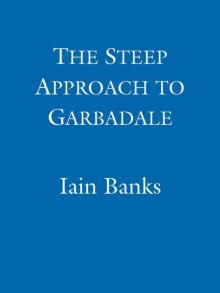 The Steep Approach to Garbadale
The Steep Approach to Garbadale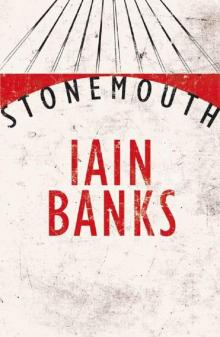 Stonemouth
Stonemouth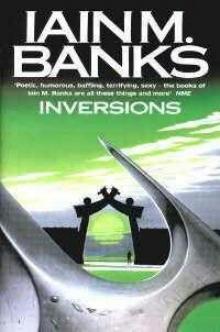 Inversions c-6
Inversions c-6 Raw Spirit: In Search of the Perfect Dram
Raw Spirit: In Search of the Perfect Dram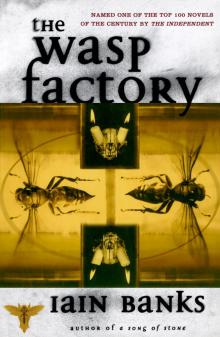 The Wasp Factory
The Wasp Factory Raw Spirit
Raw Spirit Walking on Glass
Walking on Glass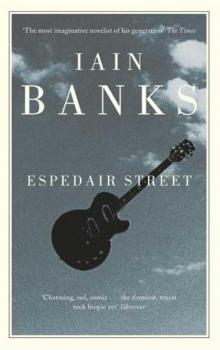 Espedair Street
Espedair Street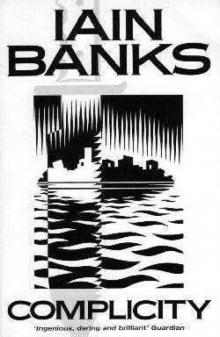 Complicity
Complicity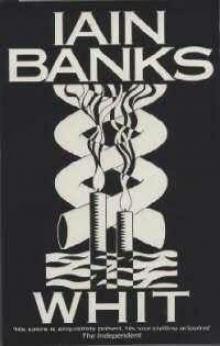 Whit
Whit Dead Air
Dead Air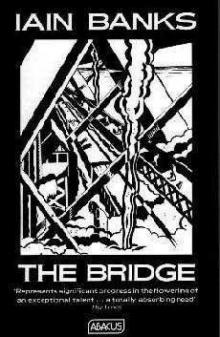 The Bridge
The Bridge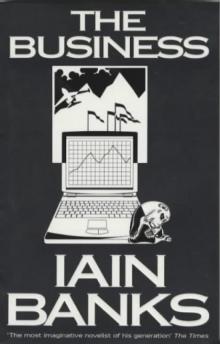 The Business
The Business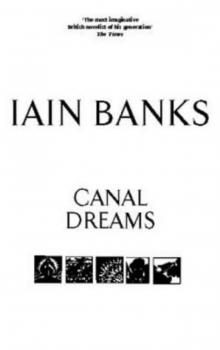 Canal Dreams
Canal Dreams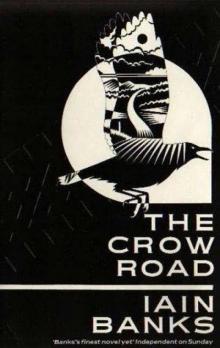 The Crow Road
The Crow Road